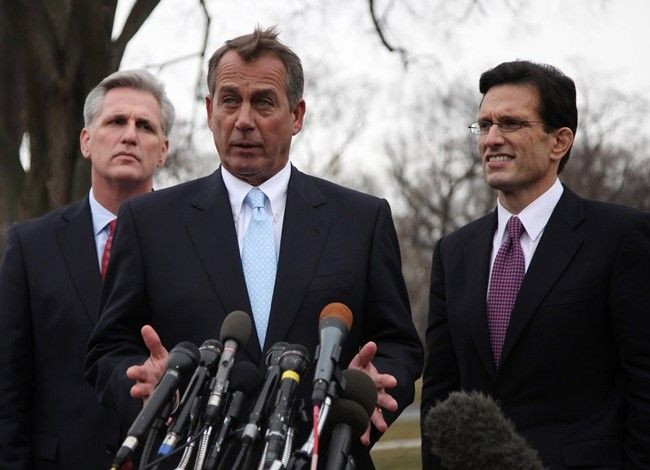Top Republicans say Obama budget plan to 'destroy jobs,' 'fails'

Top House Republicans reacted to President Barack Obama's 2012 budget proposal on Monday, saying that it would destroy jobs and that the President missed a unique opportunity to reduce the federal government's budget deficit, which would rise to $1.65 trillion under the plan.
House Speaker John Boehner, R-OH, said on Monday that the President's budget was not winning the future.
Boehner used a phrase Obama has been using to describe his agenda on how to make the U.S., its businesses and workers more competitive for jobs in the global market place. The President's plans for the just proposed budget include his priorities on spending for education, infrastructure, and innovation in science and technology, that he believes will help the U.S. compete.
The president's budget will destroy jobs by spending too much, taxing too much, and borrowing too much. By continuing the spending binge and imposing massive tax hikes on families and small businesses, it will fuel more economic uncertainty and make it harder to create new jobs, Boehner said.
Boehner said that in the next few weeks, House Budget Chairman, Rep. Paul Ryan, R-WI, will offer a comprehensive budget for the next year that will contrast sharply with Obama's budget.
Obama's $3.7 trillion spending plan for 2012 would be accompanied by a $1.1 trillion deficit. The adminstration expects fiscal 2011 to see the the largest-ever budget deficit of $1.65 trillion.
Obama said on Monday that Monday's budget would reduce the share of federal spending not related to security programs to their lowest level as a percentage of GDP since the Eisenhower administration.
Obama said the unveiled budget was a down payment on reducing the budget deficit, adding that more work was needed through discussions between Democrats and Republicans to address long term challenges such as reducing domestic spending, health care costs and spending through tax breaks and loopholes.
Today, the President missed a unique opportunity to provide real leadership by offering a budget that fails to address the grave fiscal situation facing our country, said Rep. Eric Cantor, D-VA.
He cited the nation's 9.0 unemployment rate, the nation's slow economic growth and uncertainty created by our skyrocketing debt.
The total public debt outstanding as of Monday was $14.08 trillion, according to the U.S. Treasury. Under President Obama, the total public debt outstanding grew from $10.6 trillion to $14.08 trillion. Under former President George W. Bush, the debt grew from $5.7 trillion to $10.6 trillion.
President Obama's budget doubles down on the bad habits of the past four years by calling for more taxes, spending and borrowing of money that we simply do not have, Cantor said.
© Copyright IBTimes 2025. All rights reserved.





















